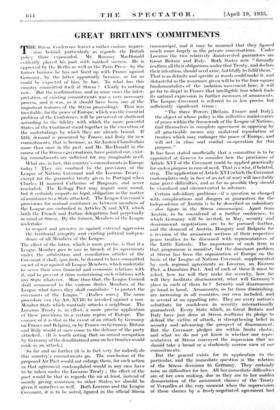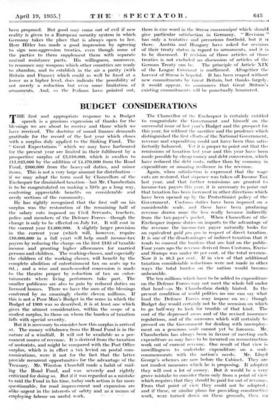GREAT BRITAIN'S COMMITMENTS T HE Stresa Conference leaves a rather curious
impres- sioii behind, particularly as regards the British policy there expounded. Mr. Ramsay MacDonald evidently played his part With marked sticeess. He is approved by the Berlin as well as the Paris Press—by the former because he has not lined •up With Fiance against Germany, by the latter apparently because, so far as could be expected of him, he has. TO what has this country committed itself at Stresa ? Clearly to nothing new. But the reaffirmation, and in some cases the inter- pretation, of existing commitments was a very necessary process, and it was, as it should .have been, one of ;the important features of the Stresa proceedings. That was inevitable, for the peace of Europe, which was the essential problem of the Conference, will be preserved or shattered according to the fidelity with which the more powerful 'States of the Continent stand together in the execution of the undertakings by which they are already bound. If little demand is presented by France and Italy for new commitments, that is because, as Sir Austen Chamberlain more than once in the past, and Mr. 'MacDonald in the course of the Stresa cylversations, have pointed out, exist- ing commitments are sufficient for any imaginable need.
What are, in fact, this country's commitments in Europe today ? They are confined to the provisions of the League of Nations Covenant and the Locarno Treaty— except for the guarantee treaty given to Portugal when Charles II married Catherine of Braganza, and never rescinded. The Kellogg Pact may impart some moral, but it certainly imparts no legal, obligation in the matter of assistance to a State attacked. The League Covcnant's provisions for mutual assistance as between members of the League are embodied in Articles X and XVI, which both the French and Italian delegations had perpetually in mind at Stresa. By the former, Members of the League undertake to respect and preserve as against external aggression the territorial integrity and existing political indepen- dence of all Members of the- League.
The effect of the latter, which is more precise, is that if a League Member goes to war in ,breach of its agreements under the arbitration and conciliation articles of the Covenant it shall, ipso facto, be deemed to have committed an act of war against all League Members, which undertake to sever their own financial and economic relations with it, and to prevent it from maintaining such relations with any State whatever. More than that, theLeague Council shall recommend to the various States Members of the League what forces they shall contribute " to protect the covenants of the League." (Italics ours:) The same procedure can (by Art. XVII) be invoked against a non- Member State which wantonly attacks a neighbour. The Locarno Treaty is, in effect, a more precise application of these provisions to a certain region of Europe. The essence of it is that in the event of an attack by Germany on France and Belgium, or by France on Germany, Britain and Italy would at once come to the defence of the party attacked. (It is worth noting that an armed occupation by Germany of the demilitarized zone on her frontier would rank as an attack.) So far and no further (it is in fact. very far indeed) do this country's commitments go... The conclusion of the proposed Air Pact would not enlarge them, for such action as that agreement contemplated would in any ease have to be taken under the Locarno Treaty ; the effect of the pact would be that as regards the air atleast, instead of merely giving assistance to other States, we should. be given it ourselves as well. Both Locarno and the League Covenant, it is to be noted, figured in the official Stress communigu4 and it may be assumed that they .figured 'much* more largely in the priyate conversations. Under LOcarno the two relatively disinterested guarantors are Great Britain and Italy. Both States now " formally reaffirm all their obligations under that Treaty, and declare their intention, should need arise, faithfully to fulfil them." That is as definite and specific as words could make it, and distasteful as the assurance given will be to the four-square fundamentalists of the isolation movement here,..it will go far to dispel in France that intelligible fear which finds its natural expression in further increases of armaments. The League Covenant is referred to in less precise but sufficiently significant terms : "The three Powers, [Britain, France and :Italy], the object of whose policy is the collective maintenance of peace within the framework of the League of.Nations, find themselves in complete agreement in opposing by all practicable means any unilateral repudiation of treaties which may endanger the peace of Europe, and will act in close and cordial co-operation .for this purpose." • It has been stated unofficially that a committee is to be appointed at Geneva to consider how the provisions of Article XVI of the Covenant could be applied practically for such a.purpose in ease of need. That is a wise, if belated, step. The application of Article XVI (which the,Covenant contemplates only in face of an act of war) will inevitably raise grave difficulties, and as far as possible they. should be visualized and circumvented in advance.
Certain subsidiary problems—if a question' so charged with complications and dangers as guarantees. for the independence of Austria is to be described as subsidiary —also figure in the Stresa cammuniqué. Apart from Austria, to be considered at a further conference; to which Germany will be invited, in May, security • and disarmament negotiations are to be pursued further, and the demand of Austria; Hungary and Bulgaria for a revision of the armament sections of their•TeSpective peace treaties to be discussed with representatives.. of the Little Entente.- The importance' of each item im that programme is manifest, but the dominant problem at Stresa has been the organization of Europe on the basis of the League of Nations • Covenant, supplemented by such regional agreements as Locarno, an Eastern Pact, a Danubian Pact. And of each of these it must • be asked, how far will they make for security, r• how far will they facilitate disarmament, what will Germany's place in each of them be ? Security and disarmament go hand in hand. Armaments, so far from din-finishing, are increasing in all countries, our own included, and in several at an appalling rate. They are every nation's substitute for confidence in security internationally guaranteed. Every State which, as Great Britain. and Italy have just done at Stress, reaffirms its pledge to :defend .the : victim of attack, is strengthening belief in security and advancing the • prospect of disarmament. But the Covenant pledges are within limits, elastic, and what we do not yet know is whether our repre- sentatives at Stresa, conveyed the impression that we should take a broad or a studiously narrow view of our commitments. . . • But the .general exists for its application to the particular, and the immediate question is the . relation off. the- Stresa decisions to Germany. They certainly raise no difficulties for her All her immediate difficulties are of ..her own making, due as they are to her. sudden denunciation of, the .armament clauses of the Treaty of Versailles at the very moment .when• the supersession of those clauses by a freely,negotiated• agreement, had been proposed. But good may come out of evil if new reality is given to a European security system in which Germany takes the place that is always open to her. Herr Hitler has made a good impression by agreeing to sign non-aggression treaties, even though some of the parties to them supplement them with separate mutual assistance pacts. His willingness, moreover, to renounce any weapons which other countries are ready to abandon, and to establish in the air a parity (with Britain and France) which could as well be fixed at a lower as a higher level, does indicate the possibility of not merely a reduction but even some limitation of armaments. And, as the Italians have pointed out, there is ene word in the Stress communiqué which should give particular satisfaction in Germany: " Revision " has-only a tentative and precarious foothold, but it is there. Austria and Hungary- have asked for revision of their treaty status in regard 'to armaments, and it is to be discussed. If revision of those articles of those treaties is not excluded no discussion of articles of the German Treaty can be. The principle. of Article XIX of the League Covenant is reaffirmed. Altogether the harvest of Stresa is hopeful. It has been reaped without new commitments by Great Britain. but thanks largely. it would appear. to assurances that Great Britain's existing commitments will be punctually honoured.







































 Previous page
Previous page